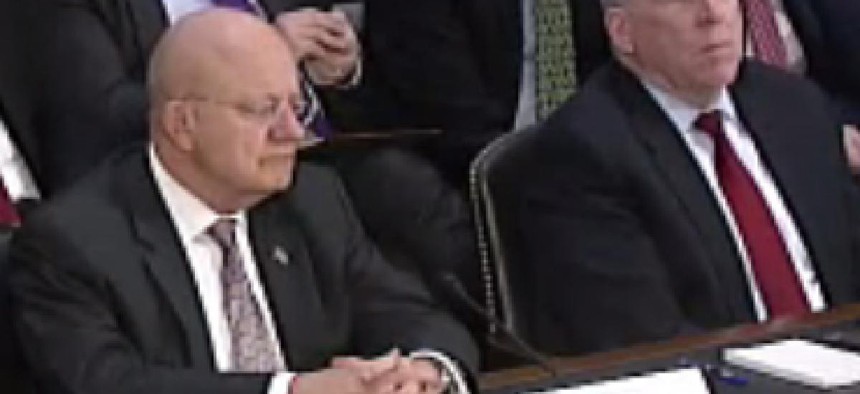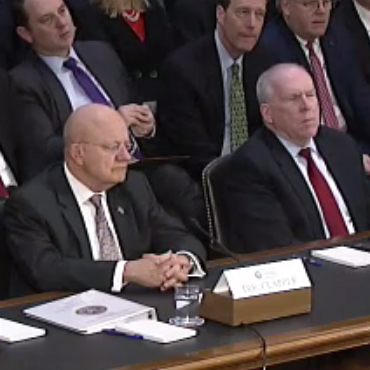Senators push IC on whether Russia hacked GOP

Senators on the intelligence committee questioned members of IC on the extent to which Russia hacked the RNC and how that played into their assessment that Putin wanted to help Trump win the election.

James Clapper, director of national intelligence and CIA Director William Brennan testify before a Senate committee on Jan. 10.
For the second time in less than a week, leaders of the intelligence community sat before senators to discuss and defend their conclusion that Russia directed a comprehensive information operations campaign to influence the outcome of the U.S. presidential election.
Last week, the Senate Armed Services Committee grilled Director of National Intelligence James Clapper; Marcel Lettre, the Defense Department's under secretary for intelligence; and Michael Rogers, director of the National Security Agency and head of U.S. Cyber Command, about whether the U.S. had responded forcefully enough to Russia to deter future hacking and information operations.
That hearing took place before the Office of the Director of National Intelligence released its unclassified report stating its reasoning for accusing Russian President Vladimir Putin of waging a campaign to discredit Hillary Clinton and help President-elect Donald Trump win the election.
The release of that report opened up several new lines of questioning by members of the Senate Select Committee on Intelligence in a Jan. 10 hearing. In particular, senators questioned panelists about the extent to which Russian hackers penetrated Republican Party and systems and how that insight played into their assessment that Putin attempted to help Trump.
In particular, senators questioned whether Russia did not leak damaging information on the Republican National Committee and Donald Trump because they chose to withhold it, or because they weren’t able to access sensitive information.
The Russians were able to make “successful penetrations of some groups and campaigns, particularly at the state level,” FBI Director James Comey said.
Comey said that Russian hackers penetrated old RNC domains but did not exfiltrate any current information. There was no evidence that the Trump campaign's systems or any current RNC servers were hacked, he said.
The FBI director stated that Russian hackers were able to penetrate deeper and wider into DNC servers than RNC servers.
That in part fueled the IC’s assessment that Putin was actively trying to undermine Clinton and help Trump win the election, though Clapper stated there was more supporting evidence that could not be revealed in an unclassified setting.
Comey also stated that Russian hackers did penetrate some state voter databases, but that there was no evidence that any data was manipulated.
Sen. Ron Wyden (D-Ore.) asked Comey if the FBI was investigating whether or not any members of the Trump campaign or transition team had ties to Russia, but the FBI director said he could not confirm or deny whether any such investigations were taking place.
A number of GOP senators reiterated the IC’s findings that Russia did not hack voting machines and directly alter any election results. But when Sen. Joe Manchin (D-W.Va.) characterized the IC as saying that Russia’s actions had no impact on the outcome of the election, Clapper interjected with a qualifier about the entire Russian campaign to influence public opinion.
“We did not assess the impact on the electorate, we did not do public opinion polls,” he said. “So we just can’t say about whether the release of the hacked information, how that changed any voter's opinion, we don't know.”
Clapper stressed repeatedly that the extent of Russia’s efforts went well beyond any traditional espionage and involved far more effort than any past attempts to influence U.S. elections, even those going back to the 1960s.
“What is unique and disturbing about this election, 2016, is the aggressiveness and the variety of tools they used and their activism in trying to convey information, which they stole in an effort to influence the outcome of the election,” he said.
Sen. Marco Rubio (R-Fla.) argued that at the end of the day, Russia succeeded. He stated that before the election, one candidate was alleging the vote might be rigged; after the election, some questioned the legitimacy of the vote due to Russia’s meddling, and the president-elect has been questioning the IC.
“This sounds like a pretty effective and successful effort to sow chaos, to undermine credibility of our leaders and of our government institutions,” Rubio said. “In essence it sounds like they achieved what they wanted -- to get us to fight against each other over whether our elections were legitimate.”
Rubio then asked Clapper whether it was possible for Russia or other actors to use cyber tools to plant fake evidence on political figures to undermine or discredit them.
“The next worrisome trend in the cyber business will be the compromise of the fidelity of information and whether it is a criminal purpose or a political purpose. So it is well within the realm, I think, of possibility,” Clapper said.


